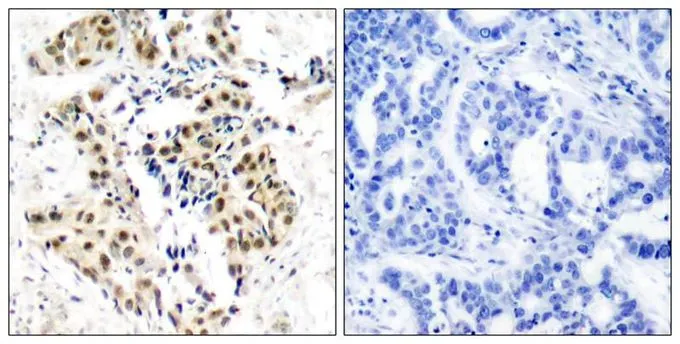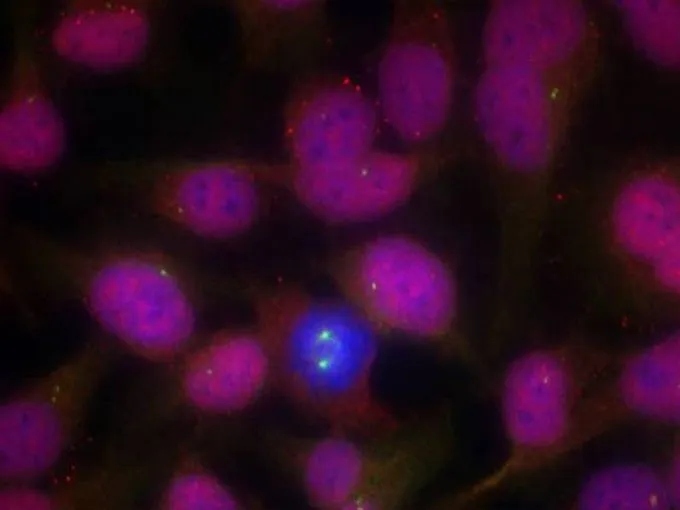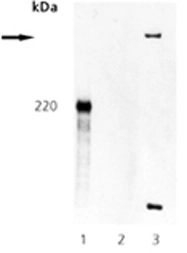ATM antibody [2C1]
GTX70103
ApplicationsFlow Cytometry, ImmunoFluorescence, ImmunoPrecipitation, Western Blot, ChIP Chromatin ImmunoPrecipitation, ELISA, ImmunoCytoChemistry, ImmunoHistoChemistry, ImmunoHistoChemistry Paraffin
Product group Antibodies
ReactivityHuman, Monkey, Mouse, Rat
TargetATM
Overview
- SupplierGeneTex
- Product NameATM antibody [2C1]
- Delivery Days Customer9
- Application Supplier NoteRecommended Starting Dilutions:For WB: Use at a dilution of 1:500-1:3000. Predicted 350 kDa. For IHC-P: Use at 5 microg/mL. Antigen retrieval in Citrate buffer is recommended.For IP: Use at a concentration of 1-10 microg/ml. For ICC/IF: Please refer to the publication by Harry Scherthan, et.al., 2000 and Yiyoung Liu, et.al., 2006. For FACS:Use at an dependent assay. Optimal dilutions/concentrations should be determined by the researcher.
- ApplicationsFlow Cytometry, ImmunoFluorescence, ImmunoPrecipitation, Western Blot, ChIP Chromatin ImmunoPrecipitation, ELISA, ImmunoCytoChemistry, ImmunoHistoChemistry, ImmunoHistoChemistry Paraffin
- CertificationResearch Use Only
- ClonalityMonoclonal
- Clone ID2C1
- Concentration0.99 mg/ml
- ConjugateUnconjugated
- Gene ID472
- Target nameATM
- Target descriptionATM serine/threonine kinase
- Target synonymsAT1, ATA, ATC, ATD, ATDC, ATE, TEL1, TELO1, serine-protein kinase ATM, A-T mutated, AT mutated, TEL1, telomere maintenance 1, homolog, ataxia telangiectasia mutated, serine/threonine kinase ATM
- HostMouse
- IsotypeIgG1
- Protein IDQ13315
- Protein NameSerine-protein kinase ATM
- Scientific DescriptionThe protein encoded by this gene belongs to the PI3/PI4-kinase family. This protein is an important cell cycle checkpoint kinase that phosphorylates; thus, it functions as a regulator of a wide variety of downstream proteins, including tumor suppressor proteins p53 and BRCA1, checkpoint kinase CHK2, checkpoint proteins RAD17 and RAD9, and DNA repair protein NBS1. This protein and the closely related kinase ATR are thought to be master controllers of cell cycle checkpoint signaling pathways that are required for cell response to DNA damage and for genome stability. Mutations in this gene are associated with ataxia telangiectasia, an autosomal recessive disorder. [provided by RefSeq, Aug 2010]
- ReactivityHuman, Monkey, Mouse, Rat
- Storage Instruction-20°C or -80°C,2°C to 8°C
- UNSPSC12352203
References
- Qiu L, Xu W, Lu X, et al. The HDAC6-RNF168 axis regulates H2A/H2A.X ubiquitination to enable double-strand break repair. Nucleic Acids Res. 2023,51(17):9166-9182. doi: 10.1093/nar/gkad631Read this paper
- Sible E, Attaway M, Fiorica G, et al. Ataxia Telangiectasia Mutated and MSH2 Control Blunt DNA End Joining in Ig Class Switch Recombination. J Immunol. 2023,210(4):369-376. doi: 10.4049/jimmunol.2200590Read this paper
- Li J, Zhao H, McMahon A, et al. APE1 assembles biomolecular condensates to promote the ATR-Chk1 DNA damage response in nucleolus. Nucleic Acids Res. 2022,50(18):10503-10525. doi: 10.1093/nar/gkac853Read this paper
- Zhang Y, Ou G, Ye Z, et al. RPRM negatively regulates ATM levels through its nuclear translocation on irradiation mediated by CDK4/6 and IPO11. iScience. 2022,25(10):105115. doi: 10.1016/j.isci.2022.105115Read this paper
- Kim YH, Jo DS, Park NY, et al. Inhibition of BRD4 Promotes Pexophagy by Increasing ROS and ATM Activation. Cells. 2022,11(18). doi: 10.3390/cells11182839Read this paper
- Agborbesong E, Zhou JX, Li LX, et al. Prdx5 regulates DNA damage response through autophagy-dependent Sirt2-p53 axis. Hum Mol Genet. 2023,32(4):567-579. doi: 10.1093/hmg/ddac218Read this paper
- Li J, Ding R, Gao H, et al. New spirobisnaphthalenes from an endolichenic fungus strain CGMCC 3.15192 and their anticancer effects through the P53-P21 pathway. RSC Adv. 2019,9(67):39082-39089. doi: 10.1039/c9ra07917cRead this paper
- Wang F, Jin S, Mayca Pozo F, et al. Chemical screen identifies shikonin as a broad DNA damage response inhibitor that enhances chemotherapy through inhibiting ATM and ATR. Acta Pharm Sin B. 2022,12(3):1339-1350. doi: 10.1016/j.apsb.2021.08.025Read this paper
- Yang SC, Chen HY, Chuang WL, et al. Different Cell Responses to Hinokitiol Treatment Result in Senescence or Apoptosis in Human Osteosarcoma Cell Lines. Int J Mol Sci. 2022,23(3). doi: 10.3390/ijms23031632Read this paper
- Zhang L, Geng X, Wang F, et al. 53BP1 regulates heterochromatin through liquid phase separation. Nat Commun. 2022,13(1):360. doi: 10.1038/s41467-022-28019-yRead this paper




![ELISA analysis of antigen using GTX60404 ATM antibody [5C5]. Red : Control antigen 100ng Purple : Antigen 10ng Green : Antigen 50ng Blue : Antigen 100ng](https://www.genetex.com/upload/website/prouct_img/normal/GTX60404/GTX60404_20170912_ELISA_w_23061123_899.webp)